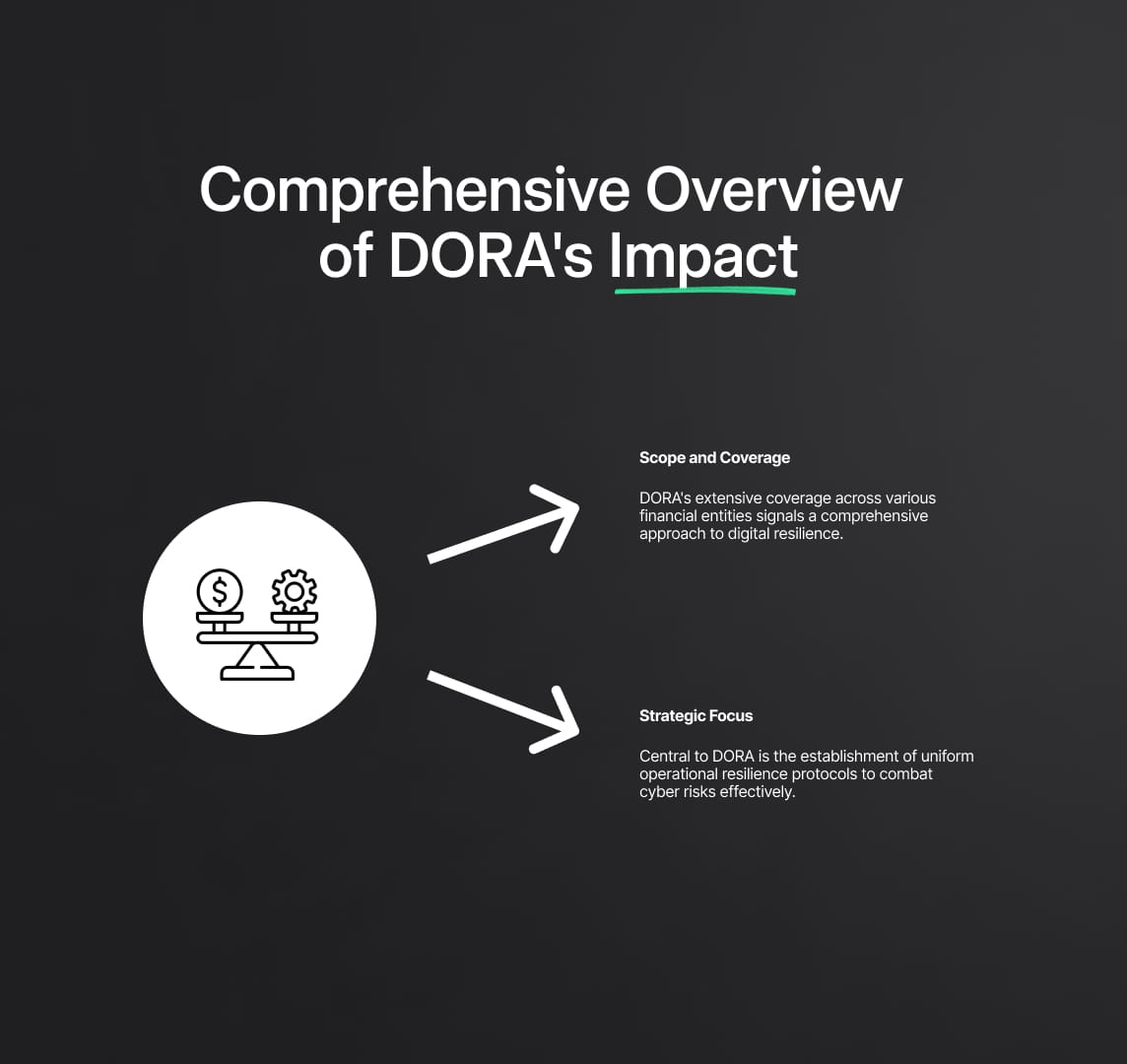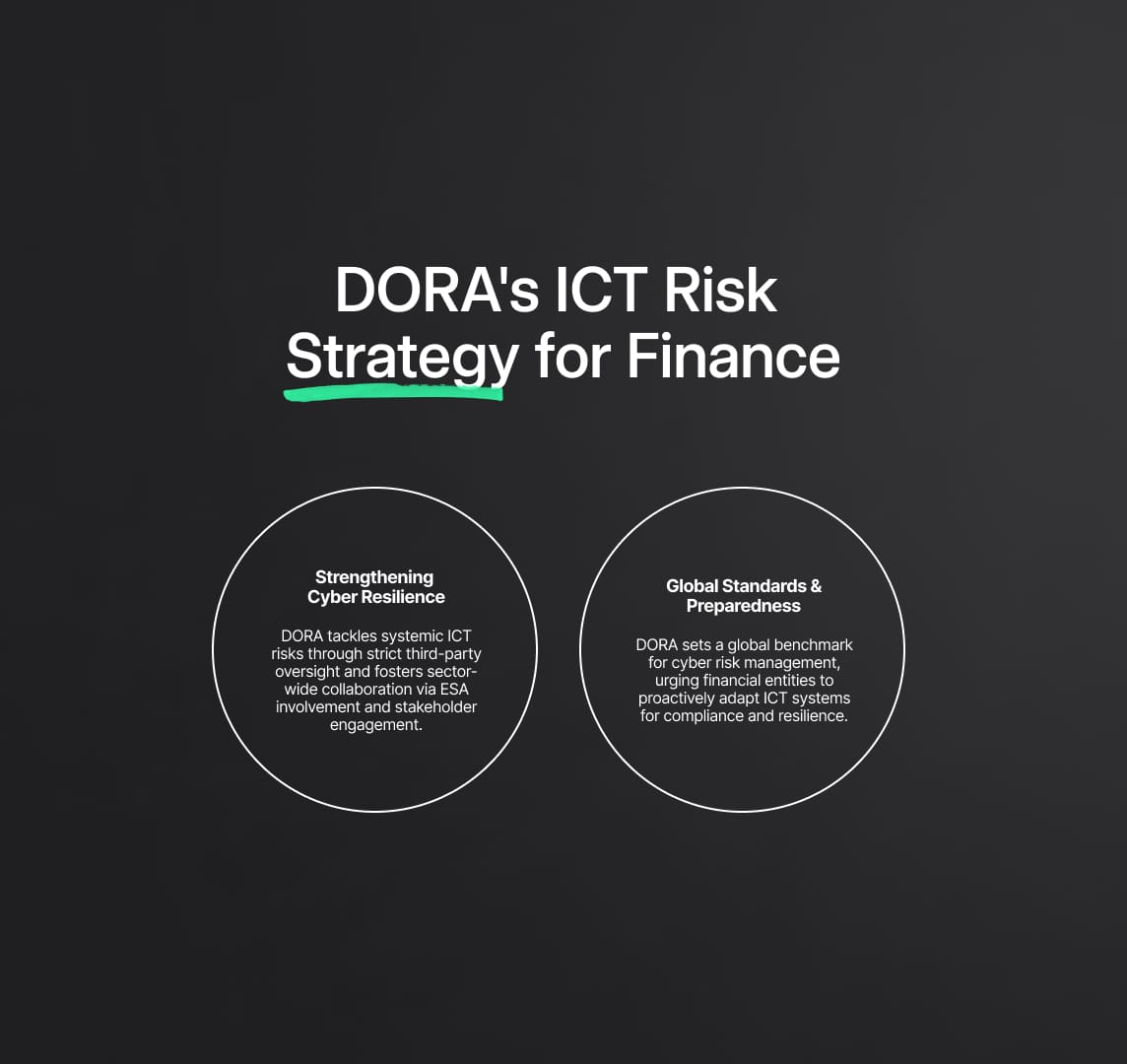DORA Regulation: EU cyber risk management
DORA Regulation, effective Jan 17, 2025, applies to 21 EU financial entities, focusing on cyber risk and ICT management. It promotes digital resilience, encourages collaboration, and targets risks in third-party ICT services, setting a new standard in the financial sector.

Digital Operational Resilience Act (DORA): Mitigating Cyber Risk in the EU Financial Sector
In January 2023, the European Union unveiled the Digital Operational Resilience Act (DORA), a groundbreaking initiative designed to significantly enhance cyber risk management across the EU's financial sector. This regulation, which encompasses a broad spectrum of 21 financial entity types, is pivotal in setting uniform standards for operational resilience. DORA primarily focuses on streamlining the management of Information and Communication Technology (ICT) risks, ensuring effective incident management, and bolstering strategies for cyber risk management.
A key goal of DORA is to deepen the understanding and management of cyber risks and ICT-related challenges within financial institutions. It promotes a culture of enhanced collaboration among financial sector authorities and advocates for inter-sectoral cooperation. One of the most critical elements of DORA is its strategic approach to addressing systemic risks that stem from the financial sector's reliance on third-party ICT service providers. The regulation mandates rigorous monitoring and management of these risks.
The European Supervisory Authorities (ESAs) play a crucial role under DORA, tasked with creating a comprehensive set of policy products. These products are instrumental in the practical implementation of the regulation's various aspects. Currently, there is an active public consultation on the second batch of these policy products, demonstrating the ongoing development and refinement process. The full implementation of the Digital Operational Resilience Act is slated for January 17, 2025, marking a significant step forward in fortifying the EU's financial sector against cyber threats.

DORA Regulation: Strengthening Cyber Risk Management in the EU Financial Sector
The Digital Operational Resilience Act (DORA) stands as a landmark initiative, fundamentally reshaping the approach to cyber risk and ICT risk management within the EU financial sector. Slated for full enforcement by January 17, 2025, DORA's reach extends to a diverse array of 21 financial entity types, underscoring the urgent need for reinforced digital operational resilience amidst a landscape increasingly prone to cyber threats. This regulation transcends mere compliance; it represents a strategic shift towards bolstering the financial sector's defenses against ICT vulnerabilities.
Comprehensive Overview of DORA's Impact:
- Scope and Coverage: DORA's extensive coverage across various financial entities signals a comprehensive approach to digital resilience.
- Strategic Focus: Central to DORA is the establishment of uniform operational resilience protocols to combat cyber risks effectively.

DORA's Multifaceted Approach to ICT and Cyber Risk in the Financial Sector
At the heart of DORA's strategy lies the goal of uniformly standardizing operational resilience measures to effectively counter cyber risks. This tactic is not only aimed at safeguarding individual financial institutions but also at protecting the wider economy from the cascading effects of cyber incidents.
Core Elements of DORA's Cyber Risk Strategy:
- Addressing Systemic Risks: A pivotal aspect of DORA is the implementation of stringent regulatory measures for third-party ICT service providers. This move targets the systemic risks arising from the financial sector's growing dependency on outsourced ICT services.
- Promoting Sector-wide Collaboration: DORA champions a collaborative framework, crucial in the interconnected digital financial landscape. It involves active participation from the European Supervisory Authorities (ESAs) in crafting policies for effective implementation. Moreover, the ongoing public consultations facilitate engagement from a broad spectrum of stakeholders, enriching the policy-making process.
Extending the Impact of DORA Beyond Compliance:
- Setting Global Precedents: DORA's innovative approach in managing cyber risks has the potential to influence global financial sectors, setting new standards in digital operational resilience.
- Encouraging Proactive Adaptation: Financial entities are encouraged to proactively adapt their ICT frameworks in anticipation of DORA's implementation, ensuring seamless compliance and enhanced cyber security.
In summary, the introduction of the DORA regulation marks a significant advancement in the EU's commitment to managing cyber risks in its financial sector. It embodies a strategic and comprehensive approach to ensuring digital resilience, setting a benchmark that could resonate globally. This regulation highlights the imperative of collaborative and proactive efforts in fostering a secure, resilient financial ecosystem in the face of evolving cyber threats.
Read More
Reduce your
compliance risks


